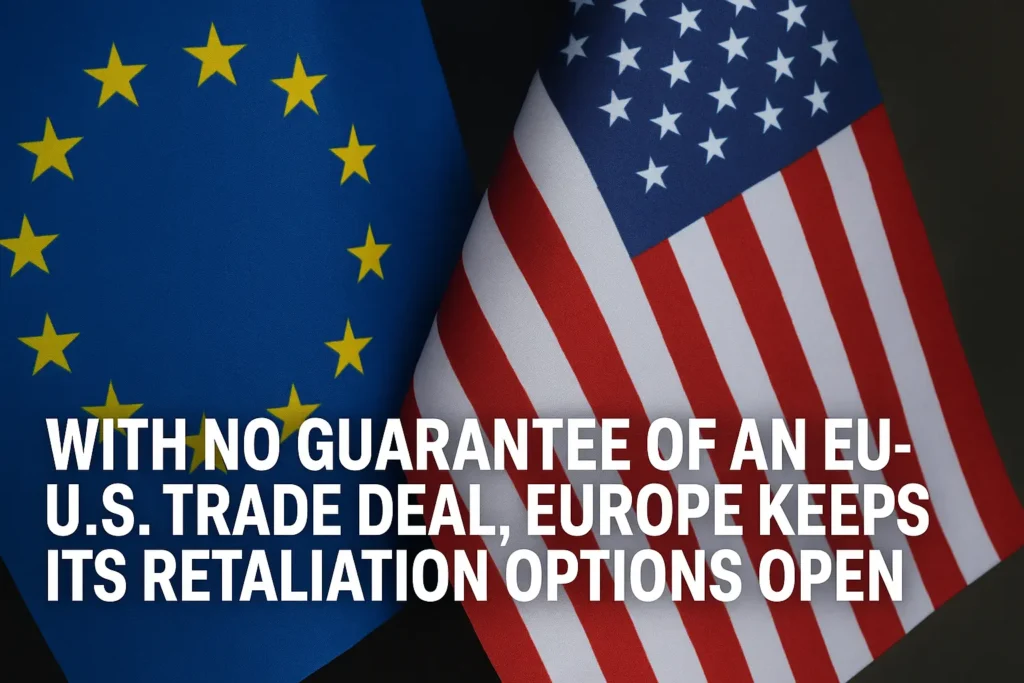With no certainty of a trade deal, the EU warns it may retaliate against the U.S. over tariffs and tech policies. Discover what’s at stake for American businesses and investors.
Tensions between longtime allies could disrupt global trade — and your wallet.
Introduction: A Fragile Alliance Faces Economic Pressure
The long-standing transatlantic alliance between the European Union (EU) and the United States is under renewed strain as both sides fail to lock in a definitive trade agreement. While cooperation continues on paper, Europe is signaling that it won’t sit back passively. If the U.S. introduces new tariffs, subsidies, or tech restrictions, the EU is prepared to retaliate — a move that could have serious consequences for American exporters, multinational companies, and even U.S. investors.
Backdrop: Why EU-U.S. Trade Talks Are Stalling
Negotiations between Washington and Brussels have been ongoing for years, but progress has slowed dramatically due to multiple sticking points, including:
- U.S. tariffs on European steel and aluminum
- Digital services taxes that EU countries are implementing
- Green subsidies under the U.S. Inflation Reduction Act
- Tech regulation disagreements over data privacy and AI governance
While leaders on both sides claim to be working toward a resolution, no concrete deal has emerged — and the EU is running out of patience.
“We are not going to wait forever,” a senior EU official told Reuters. “If the U.S. does not compromise, we have tools at our disposal.”
What Retaliation Could Look Like: Europe’s Arsenal
So, what exactly could the EU do if talks fail?
1. Tariffs on U.S. Goods
The EU could impose retaliatory tariffs on key U.S. exports like:
- Automobiles
- Agricultural products (soybeans, corn, whiskey)
- Industrial machinery
This would immediately impact U.S. producers and raise prices for European buyers, creating ripple effects across both economies.
2. Digital Taxes & Tech Regulation
The EU could push forward with digital services taxes that would disproportionately affect American tech giants like:
- Apple
- Amazon
- Meta
These companies already face intense scrutiny in Brussels, and a failed trade deal could embolden regulators to crack down harder.
3. Carbon Border Taxes
Another option is implementing the Carbon Border Adjustment Mechanism (CBAM) — a tariff on imports from countries with less ambitious climate policies. Since the U.S. has been slower to adopt aggressive climate standards, this could affect American-made products in sectors like steel and cement.
Why This Matters to Americans: The Ripple Effects
This isn’t just about politicians or trade lawyers. A breakdown in EU-U.S. trade relations could directly affect:
🏭 American Businesses
Companies that rely on exports to Europe — especially in manufacturing, tech, and agriculture — could see falling revenues and job losses.
📉 Stock Market Investors
Escalating trade tensions historically spook markets. Companies with significant European exposure, like Caterpillar, Ford, Boeing, and Deere, could suffer stock declines.
🧺 Everyday Consumers
Retaliatory tariffs may lead to higher prices on imported goods, impacting sectors like electronics, food, and luxury items.

What’s at Stake for Biden & the White House?
With the 2024 U.S. elections behind us and political tensions still running high, President Biden faces pressure to balance protectionism with diplomacy. Any perceived weakness on trade could be weaponized by political opponents, but so could any economic fallout from a trade war.
Furthermore, a strong EU-U.S. alliance is crucial in dealing with:
- Russia’s war in Ukraine
- China’s growing economic influence
- Climate change coordination
Losing momentum in trade talks could weaken the broader Western bloc on all fronts.
EU’s Message to the U.S.: Don’t Take Us for Granted
The European Union has been frustrated by what it perceives as Washington’s “America First” policies, especially around green subsidies and tech rules. While the U.S. has offered minor concessions, EU leaders believe their goodwill isn’t being reciprocated.
“We want cooperation, but not at the cost of our industries and workers,” said Ursula von der Leyen, President of the European Commission.
The message is clear: Europe is open to deals — but not desperation.
Can Diplomacy Still Win?
Despite the tension, there’s still room for optimism. U.S. Trade Representative Katherine Tai has been in active talks with EU counterparts, and both sides understand the economic risks of retaliation.
Some areas of alignment include:
- Shared concerns over China’s trade practices
- Joint interest in climate-tech development
- Common goals around digital regulation, though with differing approaches
If both sides can compromise — for example, by tweaking U.S. green subsidies and the EU easing up on digital taxation — a deal could still be within reach.
Conclusion: Uncertainty Reigns, But the Stakes Are High
The lack of a trade deal between the U.S. and EU is more than just political posturing. It’s a potential economic flashpoint that could reshape transatlantic business and investment landscapes.
For American readers, this story isn’t thousands of miles away — it’s a front-row issue with direct consequences for your portfolio, your paycheck, and your purchasing power.
Whether you’re a small business owner exporting to Europe, an investor watching stocks like Tesla and Apple, or just a consumer shopping for groceries and gadgets — keep an eye on this trade standoff. The next move might hit closer to home than you expect.
✅ Key Takeaways
- No final trade deal yet between the EU and U.S.
- Europe is signaling it may retaliate with tariffs and digital taxes.
- American exporters, tech companies, and consumers could all be impacted.
- Diplomatic solutions are still possible, but time is running out.

Aslo check it
OpenAI CEO Sam Altman Warns of Impending AI ‘Fraud Crisis’ Amid Voice Cloning Threats
